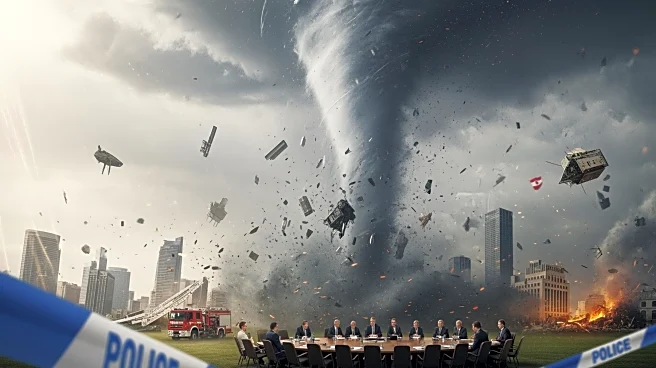What's Happening?
A devastating tornado struck the state of Paraná in southern Brazil, resulting in six fatalities and over 400 injuries. The tornado, characterized by winds exceeding 250 km/h, caused widespread destruction, flattening homes and leaving one person missing.
The severity of the storm prompted an emergency declaration as rescue teams continue to search through debris and hospitals treat dozens of seriously injured residents. This event is considered one of the worst weather disasters in the region in recent years. Brazilian President Luiz Inácio Lula da Silva expressed solidarity with the victims via social media.
Why It's Important?
The tornado's impact highlights the vulnerability of communities to extreme weather events, underscoring the need for improved disaster preparedness and response strategies. The extensive damage to infrastructure and homes poses significant challenges for recovery efforts, potentially straining local resources and requiring national and international assistance. The event also raises concerns about the increasing frequency and intensity of natural disasters, which may be linked to broader climate change patterns. The human toll and economic implications of such disasters emphasize the importance of investing in resilient infrastructure and emergency management systems.
What's Next?
As rescue operations continue, authorities are likely to focus on providing immediate relief to affected residents, including temporary shelter and medical care. Long-term recovery efforts will involve rebuilding infrastructure and homes, which may require substantial financial support and coordination among government agencies and international aid organizations. The disaster may prompt discussions on enhancing Brazil's disaster preparedness and response capabilities, potentially leading to policy changes aimed at mitigating future risks. Additionally, the event could influence public and political discourse on climate change and its impact on weather patterns.
Beyond the Headlines
The tornado's aftermath may lead to increased scrutiny of Brazil's environmental policies and their effectiveness in addressing climate-related challenges. The disaster could also spark debates on the role of renewable energy sources in enhancing community resilience during power outages caused by natural disasters. Furthermore, the event may highlight ethical considerations regarding equitable access to resources and support for vulnerable populations during recovery efforts.

















